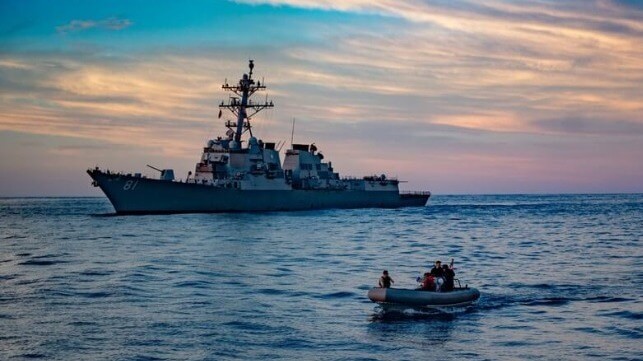Third Shipboard Fire in a Year at Naval Station Mayport

For the third time in a year, sailors have been treated for smoke inhalation after a fire aboard a warship at Naval Station Mayport, located just outside of Jacksonville, Florida.
At about 1040 hours on Monday, a fire broke out aboard the destroyer USS Winston S. Churchill at Naval Station Mayport. The crew were able to extinguish the fire and de-smoke the affected spaces on their own, but five people were injured in the process. Two were hospitalized for smoke inhalation and three others were taken to a medical facility for other reasons.
Jacksonville Fire and Rescue was called to assist, but the Churchill's crew handled the event on their own. The Navy has launched an investigation into the cause of the fire and is examining the extent of the damage.
The outcome was roughly similar to the fire aboard the destroyer USS Carney at Naval Station Mayport in December. In the early hours of December 23, a fire broke out aboard Carney and the crew sounded the alarm. They were able to extinguish the blaze and de-smoke the affected spaces, but six suffered smoke inhalation injuries and were taken to a hospital for treatment. The effects of the fire did not keep Carney in port for long: she was at sea in March for exercises with the Dwight D. Eisenhower Carrier Strike Group. (An investigation later determined that the likely cause of the blaze was arson, and the Navy is offering a reward for information leading to an arrest.)
The crew of the littoral combat ship USS Milwaukee had a similar experience last year. On the afternoon of July 29, 2022, an electrical fire occured aboard their vessel, and Jacksonville Fire and Rescue was called to assist. Three other ships at Mayport also sent crews to help fight the blaze. The fire was put out later the same day, but 13 sailors were affected by smoke inhalation and were medically examined, according to Military.com. None required hospitalization.
The U.S. Navy has a serious problem with fire prevention, according to the service's 2021 Major Fires Review and a more recent study by the Government Accountability Office. Both found that the service has a hard time gathering and using lessons-learned from shipboard fires.
"As a result, the Navy has lost lessons learned over time—such as steps that a ship can take to improve fire safety," GAO concluded. "No organization is analyzing the broad effects of fires on the Navy’s operations and strategic resources. Without conducting such analyses, the Navy will not have a complete picture of the magnitude of risks associated with ship fires."
In addition to the this top-line finding, the Navy's own Major Fires Review also found a general "lack of appreciation for the hazards associated with significant transitions, especially during maintenance periods." It noted that day-to-day firefighting training and drill sets were "ineffective" in some commands, and called out "inconsistent attention and resourcing on pierside fire safety." It also concluded that the service has some fire vulnerabilities that have gone unaddressed, particularly arson.
